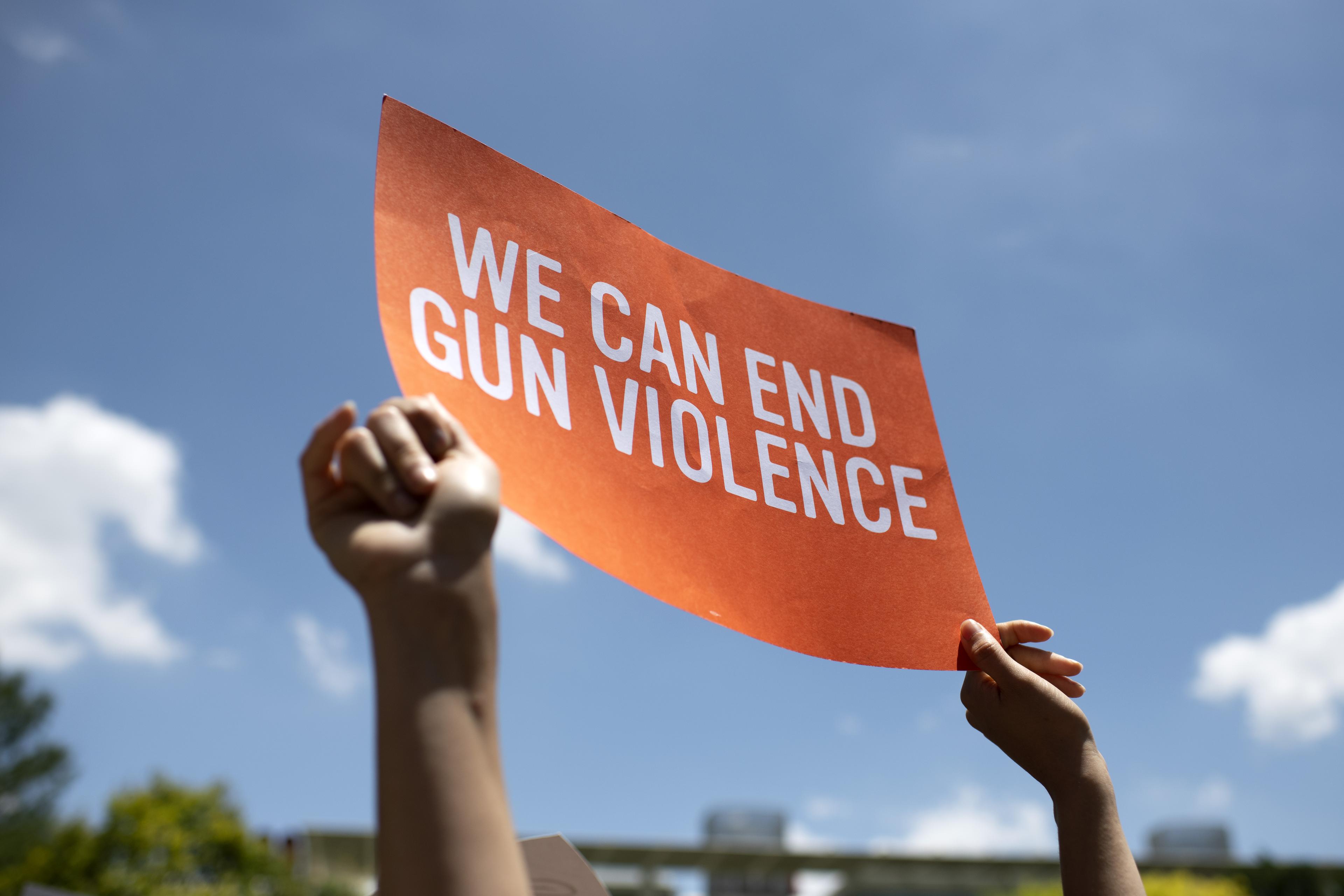Curiosity Corner: America’s Gun Dilemma and the Future of Corporate Politics
Plus, relationship advice and revisiting a controversial Amber Heard episode
Welcome to Curiosity Corner! In our first all-mailbag episode, Derek answers a Republican’s question about gun control, explains how American companies became so political, revisits a controversial Amber Heard episode, and explains how the podcast comes together. Finally, in response to a couple that requested a wedding-day video, Derek veers out of the news lane and offers some relationship advice. If you’d like your questions answered on this show, send your first name and city or state to PlainEnglish@Spotify.com.
In this excerpt, Derek responds to a listener’s question about gun control.
Devon Manze: So our first question is from Jay. He says, “Derek, I am a 53-year-old, white Republican from the South, just to establish my bona fides. I listened to the whole gun podcast without losing my temper, so a pretty balanced take by you. I think we could shift the focus to the topic that no one wants to talk about: absent fathers and the breakdown of the nuclear family. School shooters invariably come from broken homes or have absentee fathers or, at the very least, don’t have one that is a positive influence in their lives. It should at least be part of the conversation, not just the mental health of the shooter. Focus less on changing gun culture and more on changing family culture. It has the added benefits of fixing much, much more than just school shootings. Best, Jay.”
Derek Thompson: Jay, thank you for this message, and also thank you for listening as a Republican from the South. I am not a Republican nor am I from the South, but one of my goals with this podcast has always been to produce a news show that people across the political aisles can listen to without tearing their hair out. And I know we don’t always succeed—sometimes hair is torn out—but we try. When I’m describing a point of view that I don’t agree with I really want the people who I don’t agree with to hear that their position is reflected in my summary of it. Does that make sense? I want people who disagree with me to at least feel like their perspective was given a fair trial. It’s really, really hard to do. There’s tens of thousands of people listening to this show. That’s a lot of viewpoints. I’m only one person. I can only read and intuit so much, but I want people to know that is my North Star. I want people who disagree with my views to listen to the show a lot.
OK, enough filibustering. Do I agree that we should focus less on gun culture and more on family culture? It’s a good question. The short answer is no. The long answer is much longer. The short answer is no, because I don’t know how to change family culture. I don’t know how to do it en masse. I’m not saying it’s impossible. It’s just I have no confident ideas about how to change something as murky and widespread as family culture. There’s a lot of policy ideas that I would love to throw in the jambalaya. I’d love the tax code to encourage rather than penalize marriage. I would love the child tax credit to permanently pay parents to have kids. I would like more kids to grow up with two parents who are committed to one another. I would like to build more housing in and near rich cities and metros so that lower-income families could have access to higher-paying jobs, which would make family stability more common.
I would like a new bill that promoted abundance in therapy by, for example, increasing reimbursement rates for therapy, making it easier for psychology PhDs and psychiatrists and MSWs, master’s in social work, to practice virtual therapy, become therapists faster. I think all that would be great, but the truth is I don’t have a lot of confidence that those changes would achieve something as dramatic as change family culture in a way that cashes out as automatically reducing mass shootings. Maybe they would; I just don’t know. So a good reason to focus less on gun culture and more on family culture might be that changing gun culture is practically impossible, but it’s my view that changing family culture with public policy is really, really, really, really, really, really hard. That leads to a longer answer.
In the last few weeks, I’ve spent a lot of time trying to read and listen to people that I don’t agree with about guns. I’ve wanted to get a better understanding of how they see the world and it’s led me to a new synthesis about guns in America that I’m going to debut here, take out of the garage for a little bit of a test drive. I’m calling it the two American exceptions: that gun violence in America is exceptional in two ways, and depending on the exception that is most salient to you, that is how you think about guns in America. So, on the left, we focus on the fact that gun violence in America is an exception to the rule, that rich countries don’t fucking do this, and that’s entirely true. The U.S. has more gun violence than any other country in the OECD and it’s not even close.
Does anybody really think that our family culture is nine times worse than Greece, that our absentee father issue is 20 times worse than Poland, that our broken home crisis is 50 times worse than Great Britain? No way. So, from this perspective, what’s clear to me is that it’s really, really hard to eradicate the phenomenon of absentee dads in this world. But, for some reason, in this world, among similarly rich countries, only in America does the phenomenon of bad families cash out in AR-15s killing dozens of children in elementary schools. So that’s the exceptionalism that as a liberal I’m focused on. America is exceptional because we have too many damn guns.
But I want to mention a second kind of exceptionalism, and I think this one matters more to conservatives. It more accurately describes the way the conservative see this issue—conservatives, maybe, like our Republican friend Jay. And that is that most people with guns don’t kill people. Most people with guns don’t kill anybody, and that means that gun violence is an exception to the rule of gun ownership. Mass shootings are an exception to the rule of gun ownership. So the vast majority of gun owners are thinking, “We really enjoy our guns. We enjoy firing our guns or at the very least enjoy the security that having a gun provides. We enjoy these things safely and all my friends enjoy these things safely. Why should I give up this thing that I love because some people are fucking crazy and evil?”
So when people like me, who don’t like guns, who don’t own guns, when we confront guns, it is always in the context of people using guns to kill people. Think about that. If you’re a liberal who dislikes guns, do you read a bunch of articles about how fun it is to go fire off rounds? Do you read about new products, new gear? No. As a liberal who dislikes guns, I confront the existence of guns almost exclusively through the news that someone was just killed by a gun. I don’t know if this is a totally obvious point, but I think it’s profound to me so I’m just going to make it as clearly as possible one more time. Gun violence and mass shootings account for almost 100 percent of my experience of reading about guns. But if you really love guns, mass shootings account for less than 1 percent of your time thinking about and interacting with guns. To me, mass shootings seem too common. To people who love guns, mass shootings are an exception to the rule of gun ownership.
I think that distinction goes a long way to explaining why it’s so hard to get citizens to see eye to eye on this issue because we are focused on opposite exceptions. So I’m thinking out loud here when I tell you about my two exceptions theory of gun violence. I don’t know where it goes. I would love these two sides to come together and say, “Let’s pass some laws that make it a little bit harder for young men—who account for the vast majority of mass shootings—for young men to quickly and easily acquire weapons of mass shooting. And, on the other hand, let’s put some policies in this bill that move the ball forward on family culture, that answer the conservative question of, how do we fix family culture and not just punish gun owners?” Maybe there’s some compromise there, but as we said in the last episode, I am optimistic about so many things about America, but I’m not optimistic about the future of guns.
This excerpt was lightly edited for clarity.
Host: Derek Thompson
Producer: Devon Manze
Subscribe: Spotify

